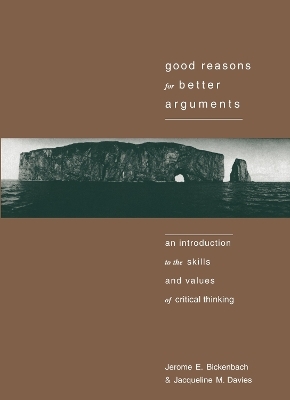
Good Reasons for Better Arguments
Broadview Press Ltd (Verlag)
978-1-55111-059-2 (ISBN)
If this text is distinctive in the extent to which it deals with the theory and the values of critical thinking, it is also noteworthy for the thorough grounding it provides in the skills of deductive and inductive reasoning; the authors present the reader with useful tools for the interpretation, evaluation and construction of arguments. A particular feature is the inclusion of a wide range of exercises, rich with examples that illuminate the practice of argument for the student. Many of the exercises are self testing, with answers provided at the back of the text; others are appropriate for in-class discussion and assignments.
Challenging yet accessible, Good Reasons for Better Arguments brings a fresh perspective to an essential subject.
Jerome E. Bickenbach and Jacqueline M. Davies both teach in the Department of Philosophy at Queen's University. Previous publications include Professor Bickenbach's Canadian Cases in the Philosophy of Law (Broadview, 3/e 1998)
Acknowledgements
1. CRITICAL THINKING: WHAT AND WHY
What’s in a Name?
Critical Thinking and the Search for Good Reasons
Who’s to Say What a Good Reason Is?
Good Reasons, Better Arguments and Rationality
Rational Discourse: Giving Reasons
Communicatively Rational Speech Acts, or Good Reasons for Better Arguments
Communicative Norms: Expectations and Obligations
Comprehensibility
Sincerity
Transparent Persuasion: The Goal of Better Arguments
A Brief Overview of this Book
Exercises
2. ARGUMENTS
Critical Thinking Skills, Phase 1: Argument Structure and Construction
The Argument: Form and Function
Arguments and Non-arguments
Arguments and Opinions
Arguments, Explanations and Definitions
Units of Meaning
Standard Form for Simple Arguments
Enthymemes and the Principle of Charity
Standard Form for Complex Arguments
Expressing Yourself in Argument Form
Exercises
3. LANGUAGE
Language as Context
Definitions: Explaining Meaning
Definitions: Arguing Meaning
Paradigm Case/Counter-example
Genus/Differentia
Understanding Conditionals and the Relationship of Implication
Language and the Gap between Intention and Communication
Ambiguity
Vagueness
Euphemism and Hyperbole
Jargon and Obfuscation
Disempowering Language
Linguistic Considerations in the Construction of Your Own Arguments
Exercises
4. GOOD ARGUMENTS
Phase 2: Evaluating Arguments
Arguments, Arguers and Conclusions: Where to Start Your Evaluation
Facts, Values and Opinions: Are They All Open to Evaluation?
The Normativity of Argument Evaluation
What Are Good Enough Arguments Good Enough For?
General Criteria of Argument Evaluation
Acceptability
Relevance
Sufficiency
Cogency: The Overall Judgement
A Few More Words on Expressing Yourself in Argument Form
Exercises
5. BAD ARGUMENTS
Fallacy-Spotting and Building a Better Argument
Dubious Premises
Premises that Mean Too Much, or Not Enough
Premises Bearing Illicitly Imported Assumptions
Irrelevance
Irrelevant Attacks on the Source of Opinion
Illegitimate Manipulation of Emotion
Changing the Subject
Improper Appeals to Authority
Hasty Conclusions and Suppressed Evidence
Building a Better Argument
Exercises
6. DEDUCTION
Three Modes of Argumentation
Aspects of Deductive Reasoning
Validity
Categorical Logic
Translation
Venn Diagrams
Immediate Inferences
Syllogisms
Fallacies of Distribution and Other Violations of the Rules for Syllogisms
Propositional Logic
The Strengths and Weaknesses of Deduction
Exercises
7. INDUCTION
Induction and Reasoning from Observation
Enumerative Induction
Representative Sampling and Justified Confidence in Induction
Reasoning about Causation
Types of Causes
Inductive Justification and Scientific Methods
Exercises
8. PRACTICAL REASONING
The Scope of Practical Reasoning
Intersubjectivity, Open-endedness and Criterial Reasoning
Conductive Reasoning
Reasoning from Analogy
Communicative Rationality: The Sufficiency Criterion in Practical Reasoning
Exercises
Answers to Selected Exercises
Appendix A: Procedure for Standardizing Complex Arguments
Appendix B: Procedure for Expressing Yourself in Argument Form
Index
| Erscheint lt. Verlag | 30.9.1996 |
|---|---|
| Sprache | englisch |
| Maße | 165 x 229 mm |
| Gewicht | 550 g |
| Themenwelt | Geisteswissenschaften ► Philosophie ► Geschichte der Philosophie |
| Geisteswissenschaften ► Philosophie ► Logik | |
| Geisteswissenschaften ► Philosophie ► Philosophie der Neuzeit | |
| ISBN-10 | 1-55111-059-8 / 1551110598 |
| ISBN-13 | 978-1-55111-059-2 / 9781551110592 |
| Zustand | Neuware |
| Haben Sie eine Frage zum Produkt? |
aus dem Bereich


